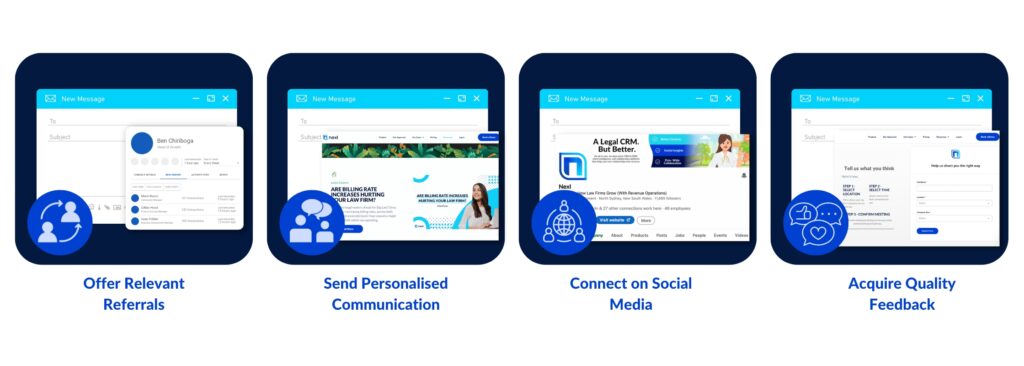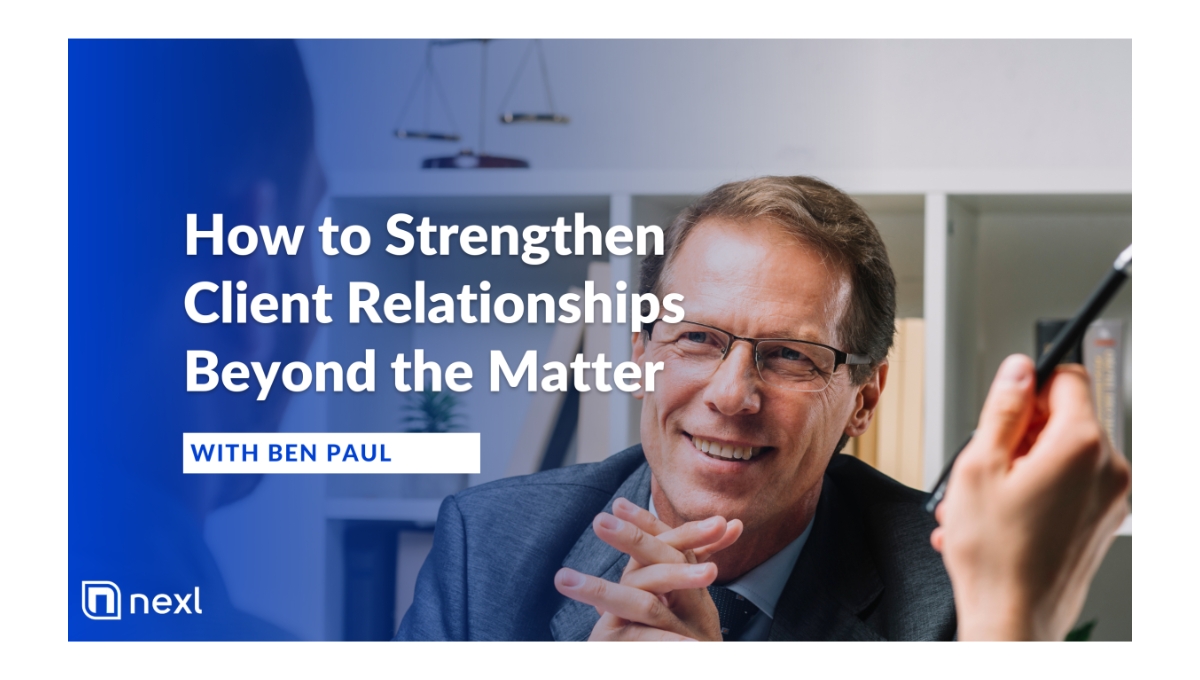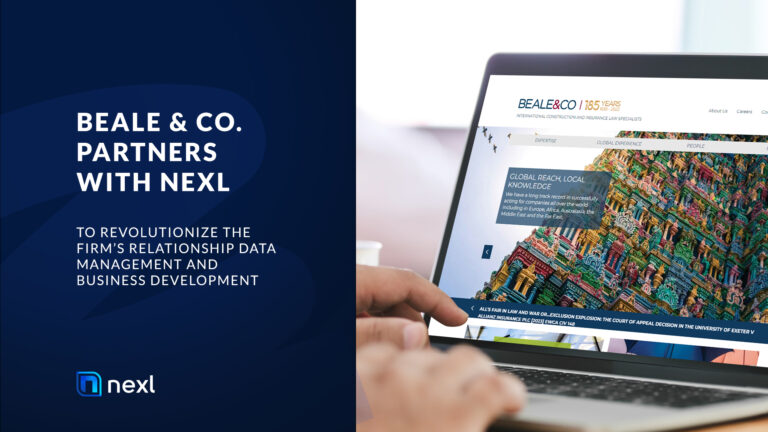When a legal matter is completed, it can be tricky for lawyers to maintain communication with their clients. This is often due to the lawyer’s relationship with the client not being strong enough or lacking key elements to maintaining a working relationship. A siloed approach among lawyers, partners, associates, and business development managers can also contribute to a disconnection with clients.
The focus of client meetings should always be on the follow-up, which fills that mysterious gap between the current, concluded matter and future matters that may arise. In an interview with expert Ben Paul, CEO & Founder of BD Ladder, we analyzed how to talk to clients after a matter is completed. This entailed examining:
1 – Why is it difficult to converse with a client outside of the current concluded matter?
2 – How does a siloed approach hinder further communications?
3 – What is the best strategy for talking to clients outside of active matters? 4 – How can Revenue Operations (and Nexl) help?

Why is it difficult to converse with a client outside of the current concluded matter?
The main question we hear lawyers ask is: “Now that I’ve completed the matter, how do I get back in touch with the client?” It can be tricky to navigate the nuances of staying connected with clients, without seeming too intrusive or needy. There are a few contributing factors to this feeling:
- Lawyers are TOO professional
Lawyers always strive to complete each matter perfectly and maintain a hyper-professional image-but this obsession with perfection and professionalism means that lawyers don’t often open up to clients along the way. Without this humanizing element, the client may feel they can only reach out if they have a specific need and intend to formally open a new matter.
Of course, the answer is not to eschew professionalism altogether-the point here is to open communication between lawyers and their clients. The purpose is to allow the client an opportunity to discuss all that is on their mind outside the given matter. Not only does this create a stronger bond, but it also allows lawyers to listen for additional legal needs-potentially cross-selling other services the law firm offers.
Essentially, by gaining an in-depth understanding of the client’s needs, lawyers broaden their relationships beyond the specific matter at hand.
2. Lawyers neglect to obtain REAL feedback
Lawyers don’t get proper client feedback because they aren’t asking the right questions. Proper client feedback is a great resource for continuing conversations and potentially serving the client elsewhere. There are many questions that lawyers could ask-however, the few below are a perfect starting point.
- How did this legal work fit into the client’s current business operations?
- How did it help further the client’s long-term business plans?
- How does the client envision their needs going forward and what are those next stages?
Maintaining communication with clients after a matter is completed is crucial for the continued success of the lawyer’s practice.
How does a siloed approach hinder further communications?
“Breaking down siloes can spark innovation in unexpected ways”
Gillian Tett
One of the main contributing factors to a siloed approach is the busy and high-pressure nature of the legal industry, where there is often little time to focus on building relationships outside of the immediate matter at hand.
Additionally, the traditional reward structure of law firms encourages lawyers to focus only on building their own practice. There is a shared mentality among lawyers to view clients as their own, not belonging to the law firm—which leads to a focus on protecting existing relationships, rather than expanding them or creating new ones. This mentality is not healthy for breaking down siloes, but is the age-old way that the industry works.
It is crucial that law firms break down their siloes! Not only does a siloed approach hinder business development, strategic plans, and cross-selling initiatives, it’s also a missed opportunity to deepen client relationships. A simple way to begin reversing this siloed approach is to find ways to introduce lawyers from different practice areas throughout a given matter—whether it’s consulting with the client on a sub-issue that involves multiple areas of law, or even just involving others in the firm in client lunches. By creating client relationships in multiple practice areas, law firms can deepen a client’s sense of community, connection and loyalty—and improve their opportunities for future engagements.
What is the best strategy for talking to clients outside of active matters?
When it comes to establishing strong relationships with existing and potential clients outside of active matters, communication is key! In order to maintain strong and lasting relationships, there are 4 key ways for lawyers to talk to their clients outside of active matters:
- Personalized communications
- Social media
- Feedback
- Referrals
- Personalized communications
Sharing a meaningful article or report that will benefit a client is an effective way to keep in touch while providing value at the same time. These can be sent out on a weekly, biweekly, or monthly basis. This goes beyond sharing a company newsletter with general legal and regulatory updates—by sharing specific, relevant updates on a one-on-one basis, lawyers make past clients feel important and remembered. This type of personalized content will help your firm stay top of mind while also building a rapport with your clients.
- Social media
Social media is one of the most popular ways for lawyers to connect with their existing and potential clients. Platforms such as LinkedIn allow you to easily engage in conversations about topics related to your practice area or even just general advice about how you handle certain matters. It’s vital you have an up-to-date LinkedIn profile that reflects your personal brand and speaks to your target audience. It can take time to update these so it may be a good idea to get an agency to write your LinkedIn profile for you. You can also use social media for advertising campaigns that re-target past clients, helping you increase awareness of your firm’s other services and stay top of mind.
- Feedback
It is crucial to ensure that every client is given the opportunity to provide feedback before closing a matter and moving forward with the relationship. Obtaining feedback is important because it gives clients an opportunity to be heard, which ensures lasting relationships. By asking the client for their feedback, lawyers show that they care about both the perceived quality of work that they provided, as well as how they can continue to improve their services and make an even more positive impact.
- Referrals
“One of the best ways to grow a law firm is through referrals, and if that is true for the firm it is true for the firm’s clients to grow their own network and business.”
Ben Paul, CEO & Founder, BD Ladder
Although referrals are a common business development practice within the legal industry, many lawyers focus solely on referring potential clients to other lawyers when the matter doesn’t align with their firm’s offerings. But there’s another category of referrals that often goes overlooked: instead of referring clients to other lawyers, you can refer other people to your clients. Keep your previous clients’ industries front of mind and listen for opportunities to make introductions when networking or meeting with other clients. This is another way to add value for previous clients, which can foster a relationship that goes beyond transactional. A client who feels supported in their personal and professional interests is more likely to return for future legal services—and to recommend you to others.
How often should you be in touch?
The right frequency of communication varies from client to client, but a good rule of thumb is to stay in contact with previous clients every 3-6 months. The key is not to bombard them with too little OR too much communication. Striking a balance between being present without being overly pushy will ensure that client relationships remain strong outside of active matters.
How can Revenue Operations (and Nexl) help?
One solution to this problem is to adopt a Revenue Operations approach. Revenue Operations is a holistic approach to managing the revenue pipeline, and it can help lawyers to focus on building long-term relationships with clients. This approach involves the use of legal technology (such as Nexl!) to manage and track interactions with clients and to automate tasks such as scheduling follow-up calls and sending personalized communications.
Nexl is a three-part system: no-data-entry CRM, relationship intelligence (ERM), and revenue operations. Nexl automatically captures all of your lawyers’ interactions. Any email sent or received and any meetings with clients, prospective clients, or referral sources are automatically captured, analyzed, and turned into actionable insights to help you accelerate your revenue growth.
Conclusion
Maintaining communication with clients after a matter is completed can be challenging, but it’s crucial for the continued success of a lawyer’s practice. The first step is to recognize common setbacks and proactively work on opening communication and feedback lines. It’s also important to minimize the negative impact of law firm siloes, by helping the client create relationships with others across the firm. Once a matter is closed, lawyers can leverage personalized communications, social media, feedback, and referrals to create opportunities to add value between matters. And by adopting a Revenue Operations approach and using legal technology, lawyers can more easily track and manage interactions with clients. Following these best practices, lawyers can successfully maintain communication with clients and build powerful long-term relationships.
Explore Nexl’s Client Retention Template which will aid your firm in maintaining strong client relationships beyond the matter.







